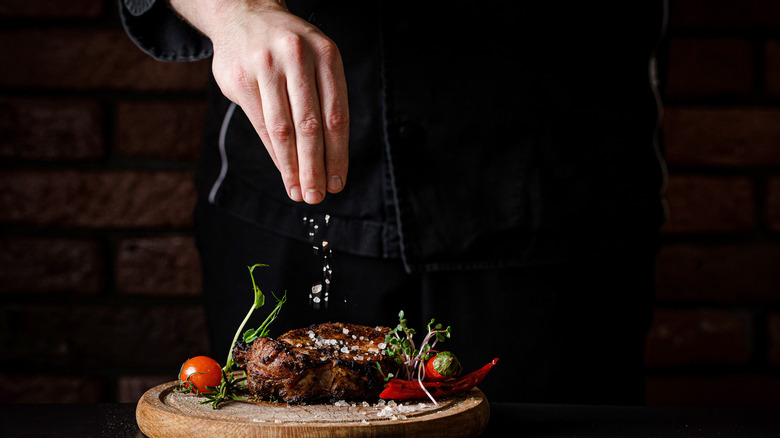The (Literal) Solution To Avoid Over-Salting Meat
We may receive a commission on purchases made from links.
"When you add your burger patty to the grill, season with salt and pepper to taste."
"Following tenderization, liberally season the steak with salt and pepper and allow to sit before the searing process."
You've probably seen advice like this in hundreds of recipes, whether it's for making burgers, steak, fish, or anything that's meat-related. You are almost always told to season with salt and pepper at one stage or another during the cooking process. The reason for this isn't just for flavor purposes, but it also helps to ensure a juicier cut of meat. America's Test Kitchen tells us that when you "salt" your meat, it helps the meat to retain juices, as the salt draws the moisture out onto the surface and allows all of those juices to be redistributed throughout the meat. In fact, adding large amounts of salt to meats goes back centuries, dating as far back as the ancient Sumerian culture, which preserved meats by heavily salting them (via Carnivore Club).
But while salting your meat has its benefits, you don't want to take a bite of your salmon or your filet mignon and feel like you just ate a salt lick. Over-salting your meat not only ruins its natural flavors but makes for a poor dinner all around. How, then, can you reap the benefits of salting your meat without over-salting it?
Make a bottle of salt spray to avoid over-salting your food
After you prepare any meal in your kitchen, you usually clean up first. You spray down the counter with a spray bottle of bleach or cleaner to get rid of any stains or remove any traces of raw foods. With the spray bottle, you generally get a decent amount of cleaning solution — no too much or too little. What if you could apply that same concept to how you prepare your meat?
As Food & Wine explains, you could purchase a bottle of "salt spray," which is essentially a spray bottle filled with a salt water-based solution. Stacey Ballis, who described her experience with salt spray, reports that the spray always gives a supposedly "perfect" amount of salt with each spray. The applications Ballis used it on were varied, ranging from corn on the cob to salads to different types of meat, with each dish receiving just the right amount of salt instead of an overbearing amount. To prepare your own salt spray at home, Food & Wine's recipe for a simple solution involves dissolving fine sea salt in hot water, although you could use kosher salt if sea salt is unavailable. You could also add your own add-ins like citrus oil or simply leave it as is.
While sprays that add different flavors to your food have been around since 2006 (via CBS News), it wouldn't hurt to try making some salt spray to help season your meat.
How can you save a piece of over-salted meat?
Even if you have a bottle of salt spray, you may still may make the mistake of over-salting your meat. Fortunately, there are a few simple options you can do to help cover, or outright remove, most of the overtly salty taste of your meat.
According to MasterClass, you can add certain ingredients that will help to "neutralize" the salt in the meat. These ingredients are usually acidic in nature, such as lemon juice, apple cider vinegar, or tomato-based sauces. You could also add dairy products like cheese or a cream sauce or, if you're looking for a side dish, you could pair the meat alongside potatoes, which can help absorb some of the harsh salt flavor.
If you want to try and "draw" some of the salt out, you can actually "rinse" your meat. LEAFtv tells us that you can put your piece of meat in a basin of cold water, which helps to bring out the salt over time. As you let your meat soak, change the water every so often, as the water will have absorbed large amounts of salt and the meat would simply absorb it again. While this wouldn't make your meat salt-free, it may help to tone down the extremely salty taste that it had at first. It also takes a long time, up to 72 hours, so this is best saved for leftover meats or meats prepared in advance.


